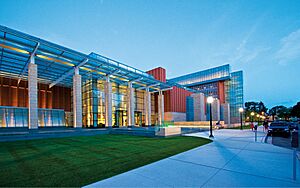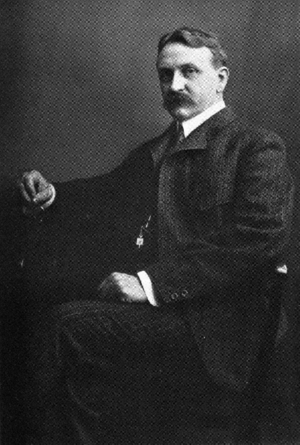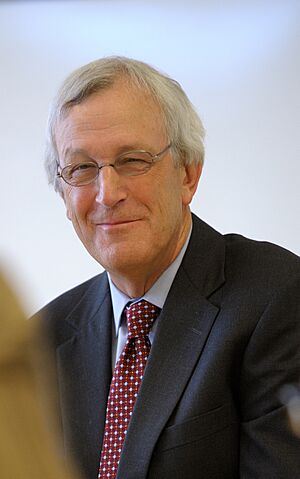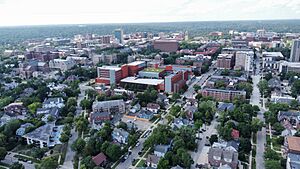Ross School of Business facts for kids
 |
|
|
Former name
|
University of Michigan School of Business Administration (1924–2004) |
|---|---|
| Motto | Developing leaders who make a positive difference in the world |
| Type | Public business school |
| Established | 1924 |
|
Parent institution
|
University of Michigan |
| Accreditation | AACSB International |
| Endowment | $435 million (2016) |
| Dean | Sharon Matusik |
|
Academic staff
|
210 |
| Undergraduates | 1,422 |
| Postgraduates | 1,873 |
| Location |
,
,
U.S.
|
| Alumni | 46,000 |
 |
|
The University of Michigan Ross School of Business (also known as Michigan Ross) is a special school at the University of Michigan. It's a place where students learn about business. The school is located in Ann Arbor, Michigan.
Michigan Ross started in 1924 as the School of Business Administration. Today, it offers many types of degrees. These include degrees for undergraduate students, master's students, and doctoral students. The school also has programs for business leaders who want to keep learning. Michigan Ross works with other schools at the University of Michigan. This allows students to earn two degrees at once. The school has a large fund of money, called an endowment. In 2016, this fund was $435 million.
Contents
History of Michigan Ross
How the School Began (1900–1925)
The University of Michigan first offered business classes in 1900. Henry Carter Adams, who led the Economics Department, helped create these courses. They were designed to prepare students for jobs in business. In 1918, the university started giving out a Certificate of Business Administration. This was a special award for students who studied business.
In 1923, the university president hired Edmund Ezra Day. He became the first leader, or dean, of the new business school. The University of Michigan School of Business Administration officially opened in 1924. It offered a two-year Master of Business Administration (MBA) degree. Students needed three years of general studies before joining. The school started with 14 teachers. One of these teachers was among the first women to teach at a business school. In 1925, the Bureau of Business Research was created. This group helped teachers do research and publish their findings.
Growing and Adding Programs (1926–1959)
In 1926, Clare Griffin became the new dean. He had first come to the university to teach marketing. That same year, a teacher named William Andrew Paton started The Accounting Review magazine. In 1935, the school began offering a PhD in Business Administration. This is the highest degree you can get. Evening MBA classes started in 1938. This allowed people who worked during the day to study. By 1940, about 200 students were enrolled. A Bachelor of Business Administration (BBA) degree was added between 1942 and 1943. This was a degree for undergraduate students.
In 1943, Russell Stevenson became the third dean. By 1947, more than 1,000 students were attending the school. In 1948, the school opened a new building. It cost $2.5 million and had a tall, nine-story tower. That same year, a famous economist named Paul McCracken joined the teaching staff. From 1950 to 1959, the school started its first program for business executives. This program helped leaders continue their education.
Expanding and Diversifying (1960–2001)
Floyd Bond became the fourth dean in 1960. The school started its first international project in Taiwan that year. Bond also created a committee to add more global business topics to classes. In 1966, Bond started a committee to attract more African-American students. This led to more efforts to increase diversity. In 1971, the school expanded its buildings. By 1971, over 1,300 students were enrolled. Most of them were graduate students. In 1972, the first two groups of former students, called alumni clubs, met in New York and California. In 1974, Alfred Edwards joined the faculty. He became known for his work in promoting diversity at the school.
Gilbert Whitaker became the fifth dean in 1979. He created a larger office to work with former students and raise money. By 1980, about 2,000 students were enrolled in degree programs. The number of teachers also grew to over 100. From 1980 to 1989, Whitaker started 17 programs that allowed students to earn two degrees from different parts of the university. In 1982, he announced a plan to raise $15 million for three new buildings, including a library. They raised $17 million, and the buildings opened by 1984. In 1983, the school joined a group called the Consortium for Graduate Study in Management. It also began offering a Master of Accounting degree. In 1990, the school received money from the government to create a Center for International Business Education.
In 1990, B. Joseph White became the sixth dean. In 1991, White and another dean, Paul Danos, changed the MBA program. They started the Multidisciplinary Action Project (MAP). This project allowed student teams to work on real business problems for companies. It became a required part of the MBA program in 1993. An international MAP option was added in 1995. By 2015, MAP was also an option for undergraduate students.
The William Davidson Institute was founded in 1992. In 1995, the Tauber Institute started as a project with the College of Engineering. In 1996, the Global MBA Program began. This program allowed students to study abroad. The Frederick A. and Barbara M. Erb Environmental Management Institute was also created that year. In 1999, the Samuel Zell and Robert H. Lurie Institute for Entrepreneurial Studies was founded. In 2000, Sam Wyly Hall opened for executive education. By 2000, nearly 200 teachers worked at the school. In 2001, the school started an Executive MBA Program for business leaders.
Modern Era and New Buildings (2001–Present)
In 2001, Robert J. Dolan became the seventh dean. In 2004, a former student named Stephen M. Ross gave $100 million to the school. This was the largest gift ever to a U.S. business school and to the University of Michigan. Because of this gift, the school was renamed the Stephen M. Ross School of Business. The gift helped pay for a big update to the campus. Many old buildings were torn down or renovated, and new ones were added.
In 2006, the Ross Leadership Initiative was created. It was later renamed the Sanger Leadership Center. This center helps MBA students develop their leadership skills. In 2009, the school started a Master of Supply Chain Management degree. The $145 million Stephen M. Ross building also opened that year. In 2010, a Weekend MBA Program was introduced. This allowed students to earn an MBA in two years while working full-time.
In 2011, Alison Davis-Blake became the school's eighth dean and its first female dean. In 2012, the Executive MBA Program expanded to a second campus in Los Angeles. In 2013, Stephen M. Ross gave another $100 million gift. This money helped finish the campus improvements. It paid for new high-tech classrooms, a new career services area, and more space for research. It also helped fund student scholarships. That same year, a Minor in Business was offered for students not studying business.
In 2014, a new 10-month Master of Management degree began. The school also started sponsoring the annual Positive Business Conference. During Davis-Blake's time, the school became more global. It offered more international experiences for students. It also partnered with Shanghai Jiao Tong University. The Desai Accelerator, which helps startup businesses, opened in Ann Arbor in 2014. This was a joint effort with the College of Engineering. In 2015, Davis-Blake announced she would step down in 2016. In 2015, Michigan Ross started the Alumni Advantage program. This program offers free executive education to all its degree alumni.
In 2016, Scott DeRue became the ninth dean. He had been a teacher at Michigan Ross since 2007. By 2017, over 3,000 students were enrolled. About 40% of new undergraduate students were women. In 2021, Francine Lafontaine became the interim dean. She had been a professor at Ross since 1991. Her research focuses on how businesses are organized and how they work. On August 1, 2022, Sharon F. Matusik became the new dean.
School Rankings
| Business school rankings | |
|---|---|
| Worldwide overall | |
| QS | 20 |
| Worldwide MBA | |
| Financial Times | 24 |
| U.S. MBA | |
| Bloomberg Businessweek | 8 |
| U.S. News & World Report | 8 |
Business schools are often ranked to show how good they are. U.S. News & World Report is a well-known ranking. In its 2019 ranking of top MBA programs, Michigan Ross was ranked seventh in the United States. It was tied with the Haas School of Business. In the same year, Michigan Ross was ranked fourth for its undergraduate business programs (BBA). In the most recent U.S. News & World Report for 2023, the school ranked 10th.
In 2023, Bloomberg Businessweek ranked the MBA program 9th overall. In 2015, U.S. News & World Report ranked Ross first in the management category for undergraduate programs. Ross was also ranked highly in other areas like marketing and finance. In 2015, the QS Global 200 Business Schools Report placed Ross as the eighth-best business school in North America. In 2016, Bloomberg Businessweek ranked Ross eighth for undergraduate business schools.
The Ross School of Business was ranked third worldwide in 2011 for its research. In 2013, Bloomberg Businessweek ranked it first for sustainability.
Campus and Learning Centers
When the business school started in 1924, it was in Tappan Hall. This is the oldest classroom building on campus. The school moved to its current location in 1948. This new site was created by tearing down ten houses. The business school building was the first tall building, or skyscraper, on campus.
Stephen M. Ross, a real estate developer and former student, gave a huge gift of $100 million to the school in 2004. This was the largest gift ever to the University of Michigan. Because of his generosity, the school was renamed the Stephen M. Ross School of Business. A New York architecture firm designed the large 270,000-square-foot building. In 2013, Ross gave another $100 million. This second gift helped upgrade the facilities. It added high-tech classrooms, a new career services area, and more space for research. It also helped fund student scholarships. In September 2017, Ross donated an additional $50 million to the school.
The William Davidson Institute
The William Davidson Institute (WDI) is a non-profit group. It was created in 1992 with a large donation from Guardian Industries. The institute is named after William Davidson, who led Guardian Industries. WDI helps with international activities at the University of Michigan. It funds research, hosts visiting scholars, and organizes talks. It also helps students get summer internships and creates teaching materials. Since 2006, over 1,800 MBA students have worked on more than 450 international projects.
The Erb Institute for Global Sustainable Enterprise
The Erb Institute was created in 1996. It was funded by a gift from Frederick A. Erb and his wife Barbara. This institute is a partnership between the Ross School of Business and the School for Environment and Sustainability. It helps students learn about business sustainability. This means learning how businesses can be good for the environment and society. The Erb Institute offers a special program where students can earn two master's degrees. In 2013, Michigan Ross (Erb Institute) received the top ranking for MBA programs focused on Sustainability.
The Joel D. Tauber Institute for Global Operations
Joel D. Tauber gave $5 million in 1995 to start the Joel D. Tauber Manufacturing Institute. This institute trains graduate engineering and business students. They learn about operations management, which is how businesses run smoothly. The program works with the University's College of Engineering. In 2007, the institute was renamed the Tauber Institute for Global Operations. This new name showed its focus on many types of businesses, not just manufacturing.
The Zell–Lurie Institute
The Samuel Zell & Robert H. Lurie Institute for Entrepreneurial Studies helps students who want to start their own businesses. It provides classes, programs, and connections to the business community. In 1999, a $10 million donation from Samuel Zell and Ann Lurie created this institute.
The Wolverine Venture Fund
The Wolverine Venture Fund (WVF) is a large fund managed by the Ross School of Business. It started in 1997. MBA students, with help from teachers and experts, invest this money. They invest in new, growing companies. The fund usually provides $50,000 to $200,000 for early-stage companies. The Wolverine Venture Fund is the oldest fund of its kind in the U.S.
The Center For Positive Organizations
This center was founded in 2002. Its goal is to help leaders build great organizations. These organizations should perform well and also bring out the best in people. The center studies topics like positive leadership and good workplace culture. Since 2014, it has sponsored an annual Positive Business Conference.
The Sanger Leadership Center
The Sanger Leadership Center at Michigan Ross was named after a gift from Steve and Karen Sanger in 2015. This center offers programs to help all University of Michigan students develop leadership skills. Some of its main programs include the Leadership Crisis Challenge and the Impact Challenge. The center uses leadership ideas developed at Michigan Ross.
Student Life
Students at the Ross School of Business publish a newspaper called the Monroe Street Journal. The school also has the Michigan Journal of Business. This is the first academic journal in business written by undergraduate students.
A fun tradition for Ross MBA students is the college football tailgate. This happens before and after every home game. Students gather around "The Bus," a school bus painted in Michigan's colors, maize and blue. The bus has a dance floor, a DJ on the roof, and couches inside. On game days, The Bus is parked for an event called the Ross MBA tailgate. Over 500 students, former students, and friends attend. This tradition has been going on for over a decade.
Michigan Journal of Business
|
Abbreviated title (ISO 4)
|
Mich. J. Bus. |
|---|---|
| Discipline | Business |
| Language | English |
| Edited by | Roger Zhong, Kabir Sodhi |
| Publication details | |
| Publisher |
Stephen M. Ross School of Business (United States)
|
|
Publication history
|
2007–present |
| Frequency | Biannually |
|
Open access
|
Yes |
| Indexing | |
| ISSN | 1941-5745 |
| LCCN | 2008214414 |
| OCLC no. | 644450557 |
| Links | |
|
|
The Michigan Journal of Business is a journal published twice a year. It is reviewed by experts in the field. Undergraduate students at the Stephen M. Ross School of Business publish it. It started in 2007. The journal publishes research papers, case studies, and theories. These topics relate to accounting, economics, marketing, and other business areas. Students at the University of Michigan make up the editorial team.
Notable Alumni
Many successful people have graduated from the Ross School of Business. Here are a few:
Activists
- Shereef Akeel (BBA): A lawyer known for human rights cases.
- Terence A. G. Davis (MBA 1962): A former member of the UK Parliament and human rights activist.
- Rachna Dhingra (BBA): A social activist working in India.
- Jesse Hill Jr. (MBA 1949): A businessman and civil rights leader.
- Jerry White (MBA 2005): Co-founder of the Landmine Survivors Network.
- Hao Wu (MBA 2000): A documentary filmmaker.
Advertising and Marketing
- John M. Fahey, Jr. (MBA 1975): Former CEO of the National Geographic Society.
- Stephen Sanger (MBA 1970): Former CEO of General Mills.
Arts and Entertainment
- William Davidson (BBA 1947): Founder of the William Davidson Institute and owner of sports teams like the Detroit Pistons.
- DJ Graffiti (BBA): A Michigan-based DJ and producer.
- Gary Gilbert (BBA): An Oscar-nominated film producer.
- Tusshar Kapoor (BBA): A Bollywood actor.
- Steve Richardson (MBA): Creator of Stave Puzzles.
- David Shayman, known as Disco D (BBA 2002): A music producer.
- Vienna Teng: A pianist and singer-songwriter.
Athletics
- Red Berenson (BBA 1962, MBA 1966): Former head coach of the Michigan Wolverines men's ice hockey team.
- Jason Botterill (MBA 2007): General manager of the Buffalo Sabres ice hockey team.
- Bill Frieder (BBA 1964): Former Michigan basketball coach.
- Ron Johnson (BBA 1969): Former NFL football player.
- Tom Lewand (MBA 1996): Former president of the Detroit Lions football team.
- Harshvardhan Joshi (MBA 2025): A mountaineer who led a carbon-neutral expedition to Mount Everest.
- William C. Martin (MBA 1965): Former President of the United States Olympic & Paralympic Committee.
- Robert Pelinka (BBA 1993): A lawyer and sports agent.
- Zoltan Mesko (BBA 2009): A punter in the NFL.
Banking and Finance
- William S. Demchak (MBA): President and CEO of PNC Financial Services.
- Haluk Dinçer (MBA): President of a large Turkish company.
- David Kellermann (BSBA): Former Chief Financial Officer of Freddie Mac.
- Shailesh Kumar (MBA): A writer, entrepreneur, and investor.
- Herbert "Bart" H. McDade III: Former President of Lehman Brothers.
- Euh Yoon-Dae (Ph.D.): Chairman of KB Financial Group in Korea.
Consulting and Accounting
- Gary Hamel (MBA PhD 1990): A well-known business expert and author.
Education
- Charles E. Bayless (MBA): Former President of West Virginia University Institute of Technology.
- James Danko (MBA): President of Butler University.
- B. Joseph White (PhD 1975): Former President of the University of Illinois system and former dean of the Ross School of Business.
- Lynn Perry Wooten (Ph.D. 1995): President of Simmons University.
Entrepreneurs
- Sam Belnavis (MBA): An executive in car racing.
- Shailesh Kumar: A businessperson and founder of Value Stock Guide.
- Sam Wyly (MBA 1957): A successful entrepreneur who founded several computer companies.
Government and Judiciary
- Roger W. Baker (MBA): Assistant Secretary for Information and Technology for the United States Department of Veterans Affairs.
- John E. Braun (MBA): A State Senator in Washington.
- Lawrence E. Butler (MBA): Former United States Ambassador to Macedonia.
- James Paul Churchill (BBA): A United States federal judge.
- Howard Flight (MBA): A British Member of Parliament.
- David Hermelin (BBA 1958): An entrepreneur and former United States Ambassador to Norway.
- Pete Hoekstra (MBA 1977): A former U.S. Congressman from Michigan.
- H. Russel Holland (BBA 1958): A United States District Judge.
- Mark Kennedy (MBA 1983): A former member of the U.S. Congress from Minnesota.
- David McKeague (BBA 1968, JD 1971): A United States federal judge.
- Donald R. McMonagle (MBA): A retired Air Force Colonel and manager at the Kennedy Space Center.
- Ronald Weiser (BBA 1966): Former Ambassador to Slovakia.
Healthcare
- Ragavendra R Baliga (MBA 2004): Director of Cardiology at Ohio State University Hospital East.
- Mahendra Bhandari (MBA): An Indian surgeon.
- Nancy E. Dunlap (MBA): A physician and former dean of the University of Virginia School of Medicine.
- Scott Ransom (MBA 1997): A physician and healthcare expert.
Hospitality
- Cameron Read (MBA 2002): Chief Financial Officer for Marriott International in the US & Canada.
Industrials
- Charles "Chuck" Conaway (MBA): Former CEO of Kmart.
- John DeLorean (MBA 1957): A General Motors executive and designer of the DeLorean car.
- Dave Deno (MBA): Former CEO of Quizno's.
- John V. Faraci (MBA 1974): Former CEO of International Paper.
- Frederick Henderson (BBA 1980): Former Chairman of GM Europe.
- Roger B. Smith (1947, MBA 1953): Former chairman and CEO of General Motors Corporation.
Information Technology
- David Bohnett (MBA 1980): Founder and CEO of GeoCities.
- Bharat Desai (MBA 1981): Co-founder, President, and CEO of Syntel Inc.
- Paul Saleh (MBA 1985): CFO of Nextel Communications Inc.
- James R. Scapa (MBA): CEO and Chairman of Altair Engineering.
- Richard Snyder (MBA 1979): Former Governor of Michigan.
Journalism
- Mark Bernstein (MBA): Former director of press operations for the Clinton Administration.
- George Blaha (MBA): Radio and television voice for the Detroit Pistons.
- Richard Lui (MBA): A news anchor for MSNBC and CNN.
- Carol Cain (MBA 1999): Senior producer and host of Michigan Matters.
Real Estate and Infrastructure
- Stephen M. Ross (BBA 1962): A well-known real estate developer.
Venture Capital
- Christopher Ilitch (BBA 1987): President and CEO of Ilitch Holdings, Inc..
- Brad Keywell (BBA 1991): Managing Partner of Bristol Ventures LLC.
- Adam Lilling (BUS): An entrepreneur and venture capitalist.
- Tige Savage (MBA 1998): Co-founder of Revolution LLC.
Professors
The Ross School of Business has many notable professors who teach and do research.
- Madeleine Albright: A former United States Secretary of State.
- Gary Hamel: A well-known business academic.
- Andrew Hoffman: A business academic.
- Paul McCracken: An advisor to presidents.
- Gerald C. Meyers: An author and former CEO of American Motors Corporation.
- Sarah Miller: A health economist.
- C.K. Prahalad: A distinguished professor of corporate strategy.
- Noel Tichy: A director of global development at General Electric.
- Marina von Neumann Whitman: An economist who advised President Nixon.
- W. Chan Kim: Co-author of Blue Ocean Strategy.
See also
 In Spanish: Escuela de negocios Ross para niños
In Spanish: Escuela de negocios Ross para niños
- Economics
- Glossary of economics
- List of United States business school rankings
- List of business schools in the United States
- List of University of Michigan people
 | Madam C. J. Walker |
 | Janet Emerson Bashen |
 | Annie Turnbo Malone |
 | Maggie L. Walker |




